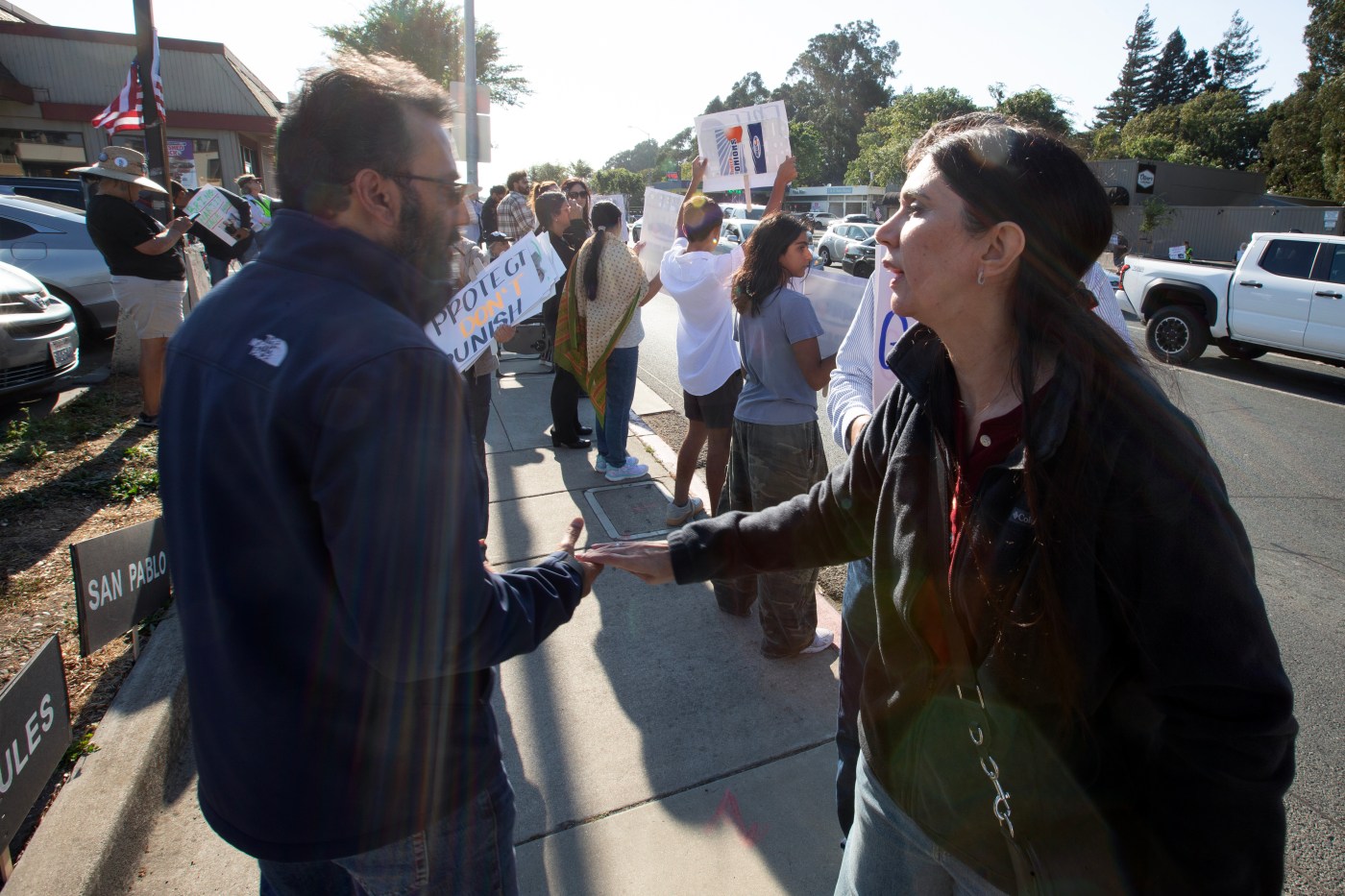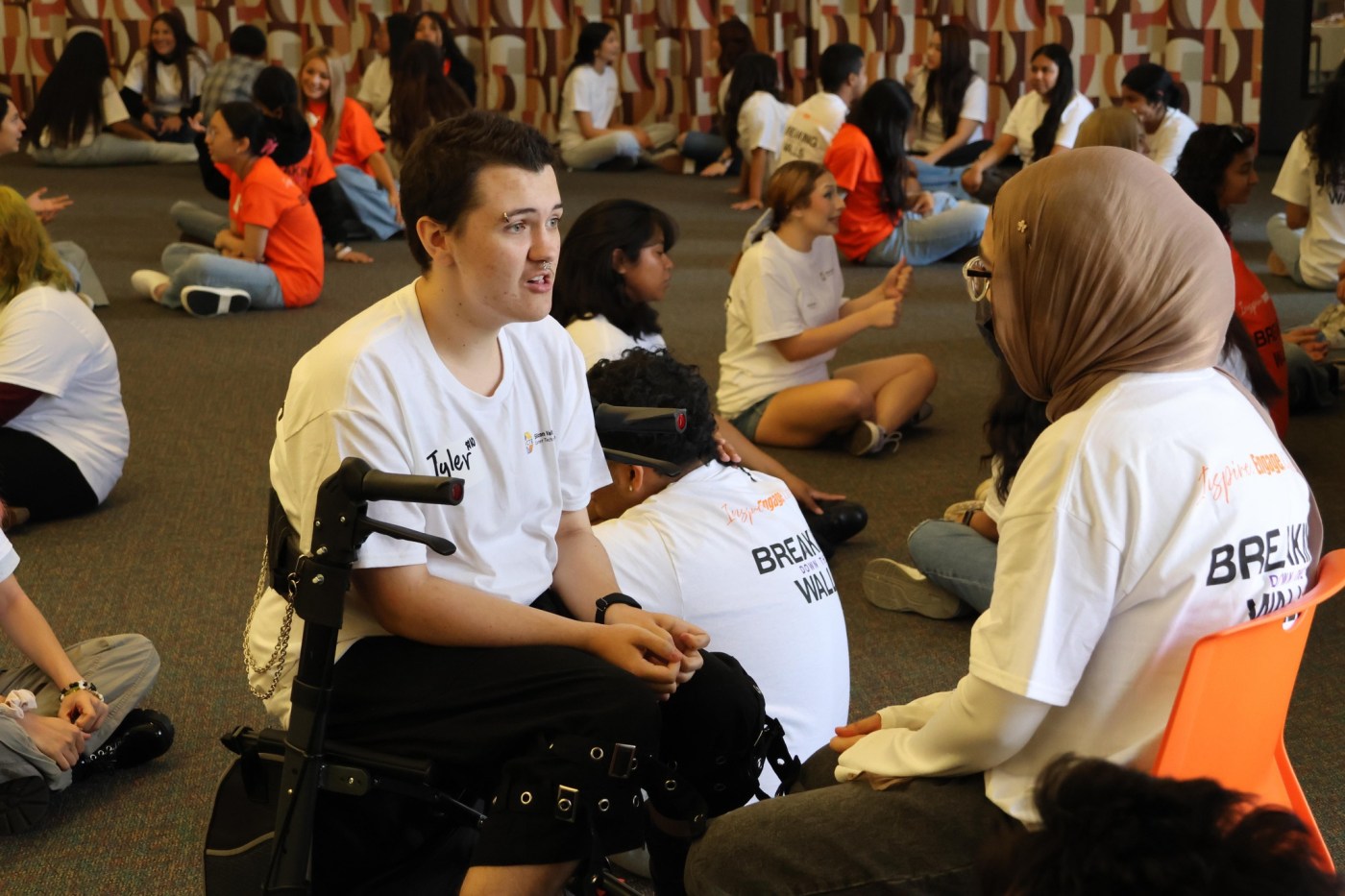EL SOBRANTE — Manjit Kaur hopped into the backseat of a family friend’s Honda to escape the unrelenting clamor of car horns outside, desperate for a quiet place to hear her mother-in-law’s voice – the first time Harjit Kaur was able to call from an ICE detention center in the southern end of the San Joaquin Valley, almost 300 miles away from her longtime Hercules home.
Kaur’s family was told that a 15-minute call from Mesa Verde ICE Processing Center would cost $52, but eight different credit cards failed to process and she was never able to connect.
Outside, meanwhile, hundreds of protesters were spending their Friday night on sidewalks and crosswalks, where regularly seen signs calling to “Melt ICE” were joined by new ones supporting Kaur and demanding “Bring Grandma Home.” All solicited supportive honks from motorists traveling along Appian Way, a major artery where tens of thousands of vehicles travel between I-80 and San Pablo Dam Road each day.
Many know the 73-year-old Kaur as a seamstress at Sari Palace in Berkeley, where she started work shortly after she immigrated to the Bay Area in 1992, hopeful to find asylum in this country from India.
But her family said she’s spent the past week in Mesa Verde — a processing center in Bakersfield that’s long failed to provide basic health care or provide records of the people who are detained there, according to an April report released by the California Department of Justice.
Kaur’s asylum case was denied in 2012, but Manjit Kaur said she has helped her get to her required check-in meetings with ICE agents ever since — a stressful legal limbo, despite the fact that her mother-in law doesn’t have a criminal record. While she said federal immigration agents previously reassured the grandmother of five she was complying with the law and could remain under supervision with work permits, she was detained Monday at the San Francisco immigration office.
“They say they’re picking up criminals; that’s not who this is,” Manjit Kaur said.
Later that day, minutes after Harjit Kaur’s second unsuccessful attempt to call, Manjjit said the last time they spoke, it was through another detainee’s account. “We’ve been trying to hold back tears so we don’t sound emotional, because she’s crying every time we speak. I can tell she’s breaking. Who’s going to be responsible for that?”
Manjit Kaur has spent a lot of time on the phone this past week — juggling time with immigration attorneys, Sikh leaders, youth groups and local activists. A large portion of the crowd are regulars with Indivisible West CoCo County, which has rallied residents for weekly protests at one of El Sobrante’s busiest traffic arteries since January, pushing back against policies handed down during Trump’s second administration.
About half of the detainees currently being held in ICE custody – an estimated 30,000 people, or nearly double the population of El Sobrante – don’t have criminal convictions, according to the Deportation Data Project, a centralized repository of individual-level U.S. government immigration enforcement data directed by UC Berkeley Law Professor David Hausman. Between May and July, the rate of ICE arrests of people without criminal records had doubled — the highest spike of any other group of detainees.
“It’s not that we didn’t try on our end,” Manjit Kaur said. “We were never worried before — not for her, there was no reason to be. This was not something we were hiding. We weren’t criminals. The color of our skin is brown, but that’s it.”
What little news that has emerged out of Mesa Verde Processing Center in recent years has been troubling. A judge with U.S. District Court for the Northern District of California called the facility out in December of 2020 for its “deliberate indifference to the safety of the detainees” during the pandemic, while the California Department of Justice reported that officials at the Bakersfield facility failed to “record and report a significant use of force incident that occurred when detainees … were transferred to out-of-state facilities,” after a peaceful hunger strike. The state DOJ said that individuals held at Mesa Verde had been there for an average of 225 days, with the longest detention being 1,118 days.
Congressman John Garamendi’s office has stepped up to support Kaur’s family and help navigate her case, including sending a letter to ICE officials. There is no mandatory timeline for immigration agents to respond.
“President Trump initially promised to go after the ‘worst of the worst’ in his immigration policy,” Garamendi said in a statement. “Yet this administration’s decision to detain a 73-year-old woman—a respected member of the community with no criminal record who has faithfully reported to ICE every six months for more than 13 years – is one more example of the misplaced priorities of Trump’s immigration enforcement.”
As the El Sobrante protest began to quiet along San Pablo Dam Road, Amrit Kaur, a Bay Area community youth organizer, said it was easy to get the word out about the event — one of Harjit Kaur’s grandchildren reached out to her on Wednesday, she helped coordinate fliers on social media, and “the village showed up.”
“There’s some comfort in the fact that we can lean back on our people and the community,” said Amrit, 22. She explained the idea of sangat, a Sikh ideal which emphasizes the importance of fostering community and spiritual support. She said past connections laid the groundwork for a network of people ready and willing to help, whether it’s coordinating a meal or helping give Harjit Kaur a voice from a Bakersfield jail.
“We don’t know the solution,” said Amrit. “But we’re here.”





